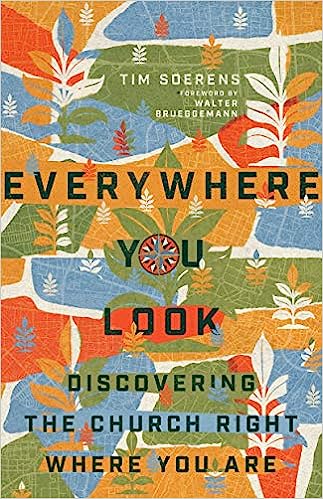I am excited about beginning our new book, Everywhere You Look: Discovering the Church Right Where You Are. For tonight, please read Chapter 1 “The Movement or Meltdown” and the first part of Chapter 2 “The Big Why.” I do not anticipate going beyond p.27 of Chapter 2 tonight. If you need a book, please let me know.
The Big Why:
Tim Sorens begins chapter 2 with a brief discussion of his childhood. He grew up in a Christian home, attended a Christian grade school, went to church every Sunday, and wasn’t allowed to watch the Simpsons. Then one day his father had the temerity to ask the question “Why?” “Why are we going to church?” “What is the whole point?”
I went to church as a child because my parents made me. I went to church as a young adult because that was the expectation. A lot of good moral people, don’t go to church and a lot of immoral people do. A lot of people who are active in our community don’t go to church, and a lot of church attendees do not. Can’t we simply worship God and follow Jesus on our own? Why the church, and not the Rotary Club?
Ontology vs. Teleology:
There is a great difference, Sorens says, between what something is (ontology) and what something is for (teleology). p.24. There is a difference between asking what is marriage and asking what is marriage for. What is an education and what is an education for? The reframing of the question is dangerous because the answer given may revolutionize our understanding of the relevant institution and cause a break with how the institution has been operating.
Think about the Declaration of Independence. It begins by answering the question of “What is the government for?” – to secure our inalienable rights, including the rights to life, liberty, and the pursuit of happiness. Thomas Jefferson was not concerned with the form of government (parliamentary democracy, or even colonialism) but its function. He asked the question of why and then evaluated whether the current governing system met that purpose. This is what we are being called to do with the church today.
The Wrong Question:
Unfortunately, Sorens points out, when faced with a decline both in attendance and identification, we too often ask the wrong question. The question we want to ask is “How do we fix the church?” Or we ask similar questions about “How do we make the church more relevant?” or “How do we get young people back into the church?” or “How do we grow the church?” p.25. These are questions that only those who are already engaged in church ask and the answers that are given are too often answers that only those who are already engaged in church care about.
For example, as Sorens points out on page 23, apart from church leaders, most people don’t care much about the various experiments related to the form of worship. I deeply care about the form of worship and most of us reading this email do (although there may be some disagreement as to the proper form). But no one outside of the church cares that much. At least in my limited experience, changing the form of worship or music does not bring more people into the church, it merely rearranges which church-engaged Christians attend. The “how” of the church is not what draws people into the church, but it is the “why.”
Tonight’s Discussion:
Tonight, we are going to discuss the way church used to be. Be prepared to discuss the church you grew up in and the reasons why you went to church and why you continue to come to church. We will finish with a discussion about what is ____________ (fill in the institution) for and what is the church for. The Catechism of The Episcopal Church gives us somewhat of an answer to this question on pages 854-55 of the Book of Common Prayer.
Other Readings:
This Sunday, the Washington Post had an opinion piece entitled “I left the church, and lost my community.” If you have time today, please read the article and think through how you might respond to Perry Bacon’s understanding of the church and how might you invite him back.
Early this summer, I read through Will Willimon’s new book Don’t Look Back. Dr. Willimon served as a bishop in the United Methodist Church and is presently on the faculty at Duke Divinity. In the book, Willimon lays out his understanding of how the United Methodist Church can come out of years of decline and the impending split to allow the Holy Spirit to create a renewed, reorganized, and rejuvenated church. (His answer is mission, mission, and mission.) I have attached Chapter 2 of his book “Good Grief” which dovetails well with tonight’s readings.
Dinner is at 6. The menu is stuffed shells with Olive Garden salad. Discussion about 6:45. Compline at 8. Hope to see you here!
Jesus said to him, “No one who puts a hand on the plow and looks back is fit for God’s kingdom.” Luke 9:62
Luke 9:62

